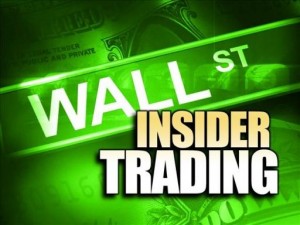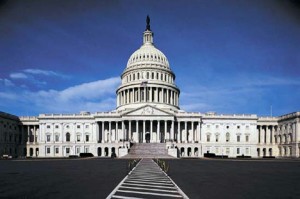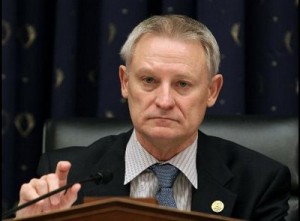 When approval of Congress barely crosses the 10% Mendoza line–an old baseball slang named after a journeyman player who consistently batted .100–it’s safe to say that improving their stock portfolio should not be a major fixation for senators and representatives. Recent press reports regarding stock trading by congressmen has touched one more nerve for a public that already believes politicians operate in their own gilded, privileged world.
When approval of Congress barely crosses the 10% Mendoza line–an old baseball slang named after a journeyman player who consistently batted .100–it’s safe to say that improving their stock portfolio should not be a major fixation for senators and representatives. Recent press reports regarding stock trading by congressmen has touched one more nerve for a public that already believes politicians operate in their own gilded, privileged world.
I am still, however, a bit torn here–not because I did the same thing (for what its worth, I never owned stocks during the time I served in Congress) and not because I think it’s a good thing to use an elected office to further personal profit. The problem I have is that the controversy, in all its unseemliness, spares us some needed introspection: about how narrow some of our financial laws are, and about what some ill-timed trades say about a larger culture that virtually all us aided and abetted.
First, the laws and their relatively limited state. The misconceptions around insider trading are extensive, even in informed circles. Its not well known, for example, that you can search the whole federal criminal code and never find the term “insider trading”; the concept is a creation of how judges and regulators have interpreted the securities fraud laws (which were written in the thirties, before E-Trade, before money markets flourished, before stocks became a middle class instrument to fund colleges and cushion retirements).
 The prevailing myth is that “insider trading” means you can’t buy or sell stocks based on “confidential information”. That’s actually wrong–the courts and regulators have focused on only one class of violations–hinging on individuals who have a specific legal or fiduciary duty to the source of the information. It’s true that you can be on the hook for criminal liability if you get information from someone that you know breached their fiduciary responsibilities–but it can be tough to prove what a trader knows about the ties between his source and the company whose confidences are being breached.
The prevailing myth is that “insider trading” means you can’t buy or sell stocks based on “confidential information”. That’s actually wrong–the courts and regulators have focused on only one class of violations–hinging on individuals who have a specific legal or fiduciary duty to the source of the information. It’s true that you can be on the hook for criminal liability if you get information from someone that you know breached their fiduciary responsibilities–but it can be tough to prove what a trader knows about the ties between his source and the company whose confidences are being breached.
So, it’s not only congressmen who are “exempt” from insider trading laws. You are too, if you overhear two strangers talking shop and call your broker based on what you heard; or if you make a trade based on a “tip” from a connected friend who doesn’t tell you where he got it. Equally immune–a well-heeled hedge fund that can pay consultants generously to ferret out information about retail sales, or inventory stacks, as long as its information edge can’t be traced to a specific company employee.
In the same way that the law is vaguer than appreciated when it comes to defining a violation, it’s also no model of clarity when it comes to defining confidentiality. Insider trading defenses regularly claim that what seemed “confidential” was actually making its way through the financial gossip zones.
The fact is that insider trading laws do not act as a barrier to well-connected people who have better than average sources of information; to the contrary, stock sales reflect one of the most inequitable, unevenly distributed information pools in our commercial life. Protecting an even flow of information is hardly the goal; the narrower, primary focus is to shield companies from having their secrets breached, in effect, by one of their own.
 Moral outrage aside, the financial institutions that some of my former colleagues “shorted” by selling their shares were hardly victims of a theft of company secrets. The entire informed public knew that the capital markets were on the verge of collapse in late September 08; even the travails of specific companies were grist for the financial tout sheets. If the banks and investment companies were “victims” in the frenzied trading that fall, there was a sweet irony to it: a set of private equity and hedge fund trading forces who had also made millions out of the derivative shell game, and its illusions of prosperity, thought nothing of ramming down the stock prices of the companies who had underwritten the party.
Moral outrage aside, the financial institutions that some of my former colleagues “shorted” by selling their shares were hardly victims of a theft of company secrets. The entire informed public knew that the capital markets were on the verge of collapse in late September 08; even the travails of specific companies were grist for the financial tout sheets. If the banks and investment companies were “victims” in the frenzied trading that fall, there was a sweet irony to it: a set of private equity and hedge fund trading forces who had also made millions out of the derivative shell game, and its illusions of prosperity, thought nothing of ramming down the stock prices of the companies who had underwritten the party.
There is an active, meaningful wrong here, but calling it “insider trading” lets it off the hook. As I’ve mentioned, the holes in the law, the specific scope of the law as it has been enforced, gives the traders a multitude of defenses. There’s no defense though to this: a member of Congress whose response to economic turmoil is to shield his or her portfolio has embraced the notion that profit values shouldn’t be constrained by social values. It’s a lapse that dismisses the allegation of self-dealing as an intrusion into one’s business affairs. Unattractive, but only a small scale version of a world view that turned to be a pretty seductive thing, this idea that maximizing wealth shouldn’t be dented by our moral instincts, and we’re wrong to think it only afflicts people with a title who run every two years.
It’s a notion that for a decade pulled the principles out of whack for both the high and mighty and the rest of us: the government backed housing icons who blithely took the risk and responsibility out of lending to grease the housing market;the investment banks who legitimized too much leverage by re-conceiving the definition of a balance sheet, and our friends who swallowed mortgage obligations they knew their circumstances couldn’t afford. Let’s not exclude the masses of us who didn’t bat an eyelash at income inequality when we were convinced we were on the rising side of the tide.
The illusion touches even good people who behave with enormous morality in other facets. The government housing enterprises were exemplary givers in the philanthropic space. Spencer Bachus, my old Alabama colleague who has taken the most heat in these “exposés,” has an impeccable record of opposing the old “bait and switch” credit card tactics that used to spike the payment rates for no good reason.
I am all for tightening the ethics rules to preclude congressmen from more than nominal stock activity involving their committees of jurisdiction–and let’s not stop there. The industry lobbyists who have much juicier information about the market than most politicians do ought to be brought under the same kinds of limitations. But in full candor: a congressman banking $13,000 off a poor judgment call is not nearly as crippling as the societal embrace of wealth unanchored by morals. The former won’t even wreck a career, the latter all but wrecked an economy. Of course, it’s like us to blame the politicians for a fever that just about gripped all of us.










Leave a Reply